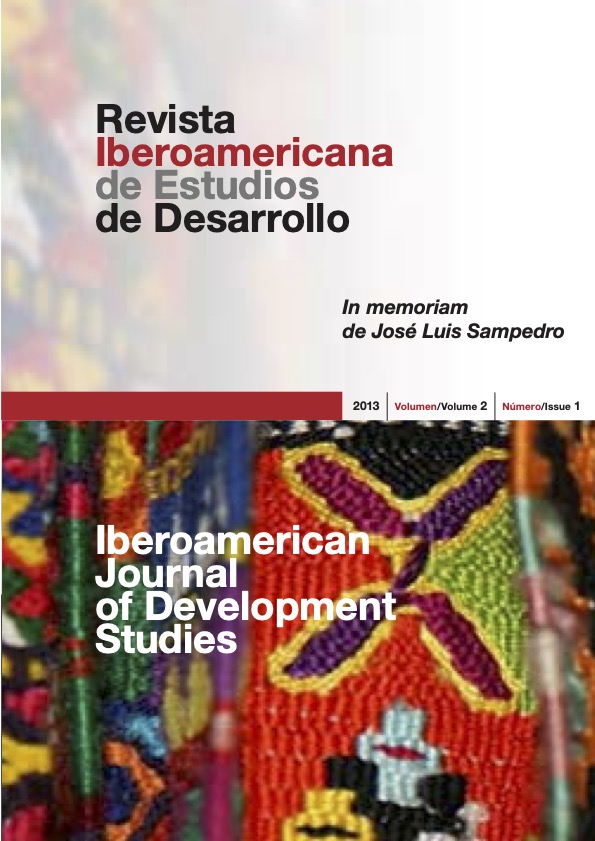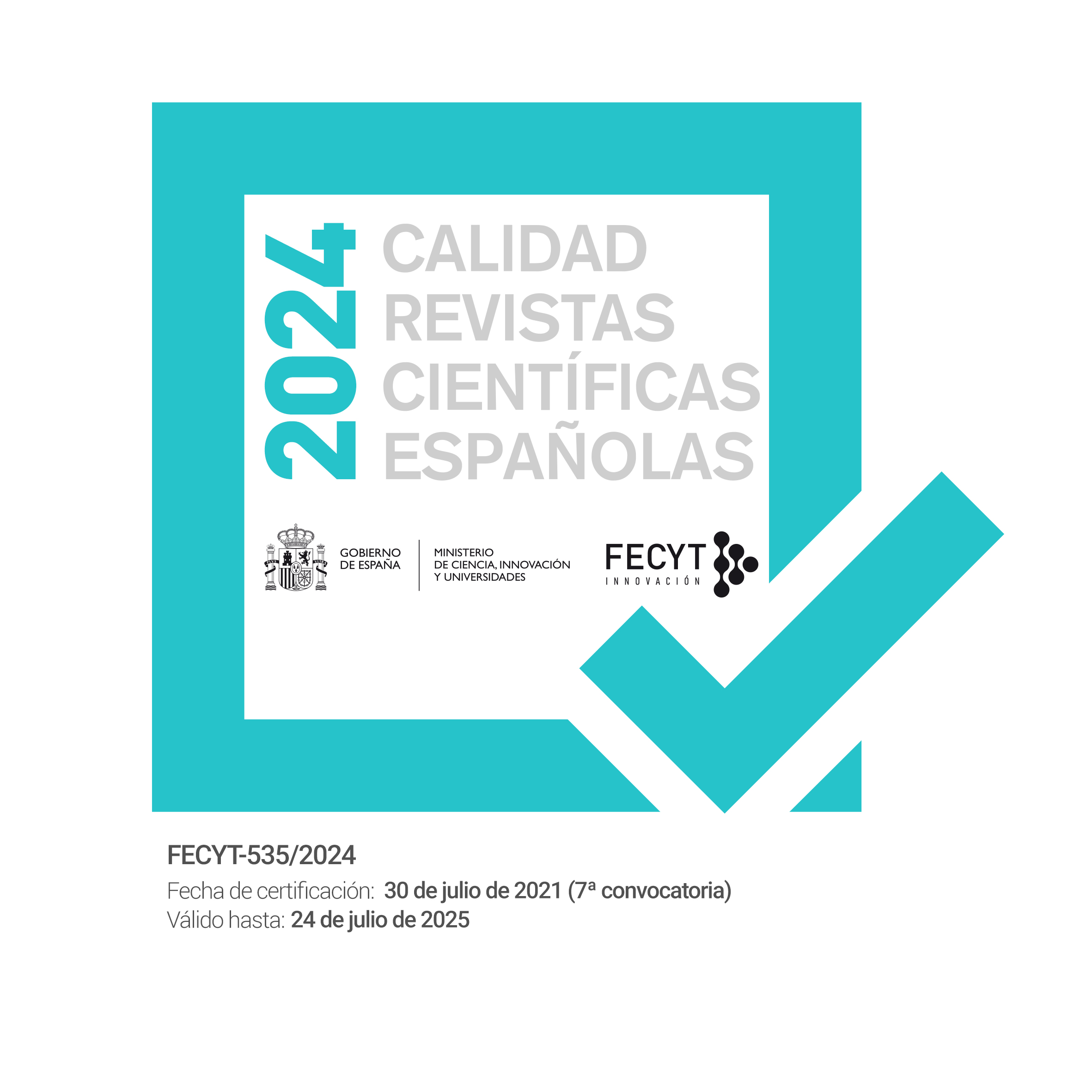Methodologies to assess the development impact of loan aid: the European experience
DOI:
https://doi.org/10.26754/ojs_ried/ijds.67Keywords:
development impact, development evaluation, loan aid, Development Finance InstitutionsAbstract
In this paper we analyse the methodologies used by the main European Development Finance Institutions (EDFIs) to assess the development impact of their operations. To do so, we identify the selection criteria of the projects funded by EDFIs using both a literature review −including their own web pages− and on-site interviews. After a short introduction, we start examining the theoretical foundations of the EDFIs’ activities, explaining in the next section what EDFIs are and how they operate. In section 3 we focus on the ex ante methodologies used by the major EDFIs to assess their development impact and in section 4 we present the conclusions of our research.
CITE AS:
Buendía, L. (2013). Metodologías para la evaluación del impacto en desarrollo de la ayuda reembolsable: la experiencia europea. Iberoamerican Journal of Development Studies, 2 (1): 94-117
Downloads
References
BRACKING S (2009). Money and power: great predators in the political economy of development. Pluto, London
BRACKING S, GANHO AS (2011). Investing in Private Sector Development: What are the Returns? Norwegian Church Aid, Oslo
CDC GROUP (2011a). CDC high level business plan 2011-2015. CDC, London.
CDC GROUP (2011b). Evaluation methodology. CDC, London
CONGDE (2012). La Ayuda Oficial al Desarrollo podría descender a niveles de 1981 [nota de prensa]. http://www.congde.org/index.php/noticias/vernoticia/id_noticia/1745 , accesed 15 January 2013
CORNER HOUSE, OLOKO D. (2010). DFID in 209-10 and the Resource Accounts 2009-10, UK Parliament, London. http://www.publications.parliament.uk/pa/cm201011/cmselect/cmintdev/writev/dfid/m8.htm , accessed 20 November 2012
DALBERG GLOBAL DEVELOPMENT ADVISORS (2009). The Growing Role of the Development Finance Institutions in International Development Policy. Dalberg Global Development Advisors, Copenhagen
DALBERG GLOBAL DEVELOPMENT ADVISORS (2011). The Growing Role of the Development Finance Institutions in International Development Policy, 2nd ed. Dalberg Global Development Advisors, Copenhagen
DEPARTMENT FOR INTERNATIONAL DEVELOPMENT (DFID) (2011). The Engine of Development: The private sector and prosperity for poor people. DFID, London
DOLLAR D, KRAAY A (2002). Growth is Good for the Poor. Journal of economic growth 7 (3):195-225.
EUROPEAN DEVELOPMENT FINANCE INSTITUTIONS (EDFI) (2011). Annual Report 2010. EDFI, Brussels
FITZGERALD V (2007). Desarrollo financiero y crecimiento económico: una visión crítica. Principios: estudios de economía política 7:5-30
FMO (2011). Annual Report 2009. FMO, The Hague
GÖSSINGER A, RAZA W (2011). Bilateral Development Finance Institutions in Europe. A Comparative Analysis of DEG, CDC, FMO and Norfund with Recommendations for Development Policy, Working Paper, 29. Österreichische Forschungsstiftung für Internationale Entwicklung (ÖFSE), Viena. http://öfse.at/Downloads/publikationen/WP29_Finance_Institutions.pdf , accessed 20 November 2012
INTERNATIONAL FINANCE CORPORATION (IFC) (2011). International Finance Institutions and Development Through the Private Sector. IFC, Washington. http:// www.developmentandtheprivatesector.org/, accessed 20 November 2012.
KINGOMBE C, MASSA I, TE VELDE D (2011). Comparing Development Finance Institutions. Literature review. Overseas Development Institute, London
KRAAY A (2006). When is growth pro-poor? Evidence from a panel of countries. Journal of development economics 80(1):198-227
LATOUCHE S (1993). El Planeta de los náufragos: ensayo sobre el posdesarrollo. Acento, Madrid
MACÍAS VÁZQUEZ A (2012). La cooperación financiera en la ayuda multilateral de la política española de cooperación al desarrollo, Memorando OPEX, 166/2012. Fundación Alternativas, Madrid
OLIVIÉ I, PÉREZ A, MACÍAS CM (2012). Inversión local, cooperación financiera y desarrollo: reflexiones sobre el FONPRODE, Documento de Trabajo, 04/2012. Real Instituto Elcano, Madrid
ORGANISATION FOR ECONOMIC CO-OPERATION AND DEVELOPMENT (OECD) (2004). Accelerating Pro-Poor Growth through Support for Private Sector Development. OECD, Paris
ORGANISATION FOR ECONOMIC CO-OPERATION AND DEVELOPMENT (OECD) (2006). Promoting Pro-Poor Growth. Private Sector Development. OECD, Paris
SAAD-FILHO A (2007). Life beyond the Washington Consensus: an introduction to pro-poor macroeconomic policies. Review of political economy 19(4):513-537 SINHA S, BORTES C, GRETTVE A (2011). Literature review of development returns to DFIs investment in private enterprises. Nathan Associates, London
TE VELDE D (2011). The role of development finance institutions in tackling global challenges, Research reports and studies. Overseas Development Institute, London
WILLIAMSON J (1990). What Washington means by policy reform. In: J. Williamson (ed.), Latin American adjustment: how much has happened. Institute for International Economics, Washington, 7-20
Downloads
Published
How to Cite
Issue
Section
License
Copyright (c) 2013 Luis Buendía

This work is licensed under a Creative Commons Attribution-NonCommercial-NoDerivatives 4.0 International License.








